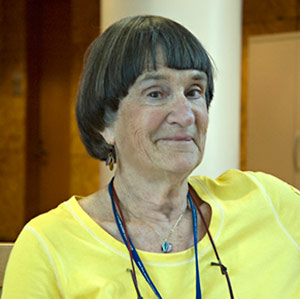At campus health center, Tangy Voce provides ‘emotional therapy’ and a chance to sing during the workday
For 10 years, Tangy Voce, a chorus made up of current and retired faculty and staff, has offered its members an opportunity to grow as musicians and gain confidence as singers.
April 28, 2010
A surprising sound greets visitors who come to University Health Services during Tuesday’s midday hour. Choral music spills out from the radiology waiting area just beyond UHS’s main entrance.
Bunny Stevens (Wendy Edelstein/NewsCenter photo)

Bunny Stevens (Wendy Edelstein/NewsCenter photo)
For a decade, Tangy Voce, the care center’s chorus, has rehearsed most Tuesdays from noon to 1 p.m. The 15- to 20-member chorus brings together current and retired Berkeley staff — and the occasional faculty member — to make music in the middle of their workday and perform four times a year.
Last week, the group moved center-stage, so to speak, when it performed for 25 people in the Tang Center’s atrium. The 10-song program included gospel, an Irish folk song, a Bach-inspired piece, Duke Ellington and Bob Russell’s “Don’t Get Around Much Anymore,” and “Where Is Love?” from the musical “Oliver.”
The driving force behind Tangy Voce is Bunny Stevens, the group’s director. Stevens led the music department at Head-Royce School for 30 years. In 2000, Stevens began helping one of UHS’s administrators coordinate the Health Net program and annual flu clinics. Volunteering at the Tang Center, she says, gives her a way to stay involved in education.
The chorus’s roster includes one active employee from the Tang Center, a retired pharmacist and physical therapist, and current staffers from across campus — including the optometry clinic, International House, animal care, and Student Musical Activities, as well as a retired chemical-engineering prof.
Songs from Tangy Voce’s repertoire
Yonder Come Day (1:58 min.)Yonder Come Day
City Called Heaven (3:12 min.)City Called Heaven
The group is “like a family,” says Stevens, adding that members have pulled together during hard times. Tangy Voce is “a very positive community” that provides “emotional therapy and camaraderie.” Chorus members have sat with a fellow singer during chemotherapy, she says.
Stevens’ musical roots extend back to her grandfather, an ordained minister, who started the Oberlin College glee club in the 1880s. Stevens started performing at four. She received her master’s in music from the University of the Pacific in Stockton. Her mother also sang and her two sisters were musicians.
“Bunny is strict but loving,” says Barbara Shayesteh, a soprano, alto, and tenor who works as a patient-services manager in Minor Hall’s optometry clinic. “She’s serious that we grow within the music,” says Shayesteh, who has watched new chorus members who were unable to read music or carry a harmony learn how to do so.
Tangy Voce’s members think of Stevens as a “benevolent dictator,” says her husband, Stan Stevens, a baritone and psychotherapist. By virtue of singing with the chorus, “many of us have gained confidence to sing solo,” he says.
His wife, who has led choruses “from the Mississippi to out here,” says she has witnessed what music can do for people. “I see people come in here depressed and leave with a lighter step,” says Stevens. Performing music “lifts their spirits.”
Experienced choral singers interested in joining Tangy Voce, or campus units interested in inviting the group to perform, can e-mail Bunny Stevens.